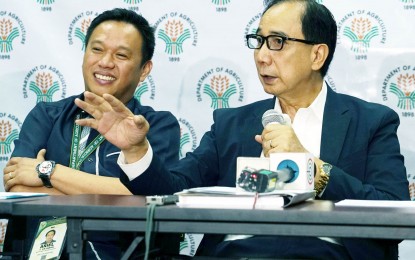
NEW THINKING IN AGRICULTURE. Newly appointed Agriculture Secretary Dr. William Dar (right) introduces the "new thinking" in agriculture for the country to attain food security during his first press briefing held at the Bureau of Soils and Water Management office in Quezon City on Tuesday (Aug. 6, 2019). With him is DA Undersecretary for Operations Ariel Cayanan. (PNA photo by Ben Briones)
MANILA -- To attain food security, the vision of President Rodrigo Duterte, newly appointed Agriculture Secretary Dr. William Dar has proposed a strategy of "new thinking" to advance the agriculture sector.
"The new thinking's vision is to have a food secure Philippines with prosperous farmers and fisherfolk. Its mission is to collectively empower farmers and fisherfolk and the private sector to increase agricultural productivity and profitability, taking into account sustainability and resilience," said Dar in a press briefing on Tuesday held at the Bureau of Soils and Water Management (BSWM) in Quezon City.
For starters, Dar said there is a need to modernize agriculture through the use of modern technology that would cover all crops, including those with export potential in processed or value-added form like coffee, cacao, cassava, tropical fruits, rubber, among others.
Relative to that, he said that "there is a need to diversify crop production in the Philippines as about 80 percent of the country’s farm lands are devoted to only three crops: rice, corn, and coconut."
"Agripreneurship should also form part of the paradigm to modernize Philippine agriculture, as farming and fisheries should be treated as business undertakings or industries," he added.
Agriculture must also be treated as an industry, "with the objective of industrializing the value chain of every agricultural commodity," Dar said.
"While productivity increase is a major objective, it is equally important to produce more income by value adding, processing, manufacturing, and developing markets for both raw and processed agricultural products," he said.
The DA chief said there is also a need to engage the private sector in investing and setting up of more agri-based industries in the countryside and developing markets for agriculture products.
"Relative to the industrialization of Philippine agriculture is creating the framework for the digitization of farming and agribusiness activities in the country where credit is made available, affordable and accessible," he noted.
There is also a need for the country to have a "systematic and long-term strategy" in developing and promoting exports of raw and processed agricultural products.
"This would require achieving economies of scale in on-farm production that would generate sustained quantity and quality of export products. The private sector’s role will be essential in developing and promoting agricultural products," he said.
At present, the Philippines only has two agricultural products that earn at least USD1 billion per year in export receipts -- bananas and coconut products (mostly in oil form). Thailand has 13 types of farm exports earning over USD1 billion each year, Indonesia has five, and Vietnam has seven.
Dar said there is also a need to promote and support farm consolidation arrangements to bring about economies of scale, particularly for crops that require mechanization and massive use of technology.
These schemes include block farming, trust farming, contract farming, and corporative farming that will make farming more efficient, where technology is used, where cost of production is reduced, and farm productivity and incomes are increased.
Another important aspect in attaining food security is the "roadmaps" in agriculture that should actively involve the private sector, which may have more access to the export markets and funding for research for development.
Infrastructure development and logistics to improve their linkages to the urban/domestic and export markets such as the “Build, Build, Build” program of the government is also a must for agriculture. (PNA)
